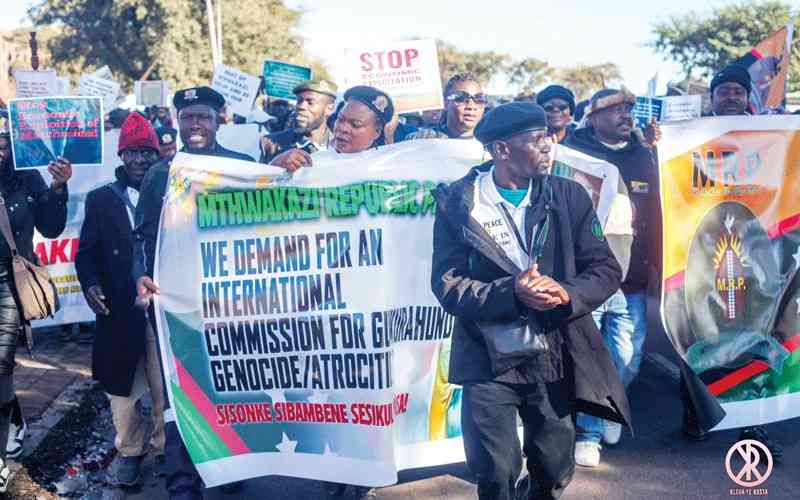
THE late nationalist and former Zapu vice-president Jason Ziyaphapha Moyo, who was killed by a parcel bomb at the African National Congress offices in Lusaka, Zambia, on January 22, 1977, has been remembered as a political and military strategist par excellence.
The commission of inquiry into his death failed to conclude its findings due to fear on the party of the late former Zambian leader Kenneth Kaunda that the outcome would spark a serious rift in the liberation movement, split of the party.
Ibhetshu LikaZulu and other stakeholders on Thursday last week conducted a memorial for the late JZ Moyo in Bulawayo, where his war exploits and anti-colonial strategies and bravery were discussed.
Senior educationist and Gukurahundi survivor Ben Moyo said JZ Moyo went into politics first in the Southern Rhodesia African National Congress, then National Democratic Party (NDP) and finally Zimbabwe African People's Union (Zapu), where he was treasurer-general and later second vice-president.
“It was at Mzingwane that he earned the name Ziyaphapha because of his prowess in athletics. He was also popularly known as Makokoba, as he came from the oldest suburb in Bulawayo. It is most auspicious that we have this memorial lecture on Workers Day,” Moyo said.
He said very few people knew that JZ Moyo was one of the few blacks who were members of the Rhodesia Communist Party, which was later disbanded.
“Cde Abraham Nkiwane, who at that time was in charge of training for special affairs (Zapu's armed wing), recounted in 1967 when they were discussing a joint Zapu/ANC campaign that James Chikerema had suggested that they send a unit to shoot some white boys at Plumtree High School to show the world that they meant business,” Moyo said.
“It was JZ who objected, saying, ‘Comrade Vice-President, we are not terrorists but freedom fighters.’ He was supported by Oliver Tambo and GD Ngwenya, who later became the commander of the Luthuli detachment in the 1967 Wankie campaign.”
- Cheeky armed robbers jailed 10 years each
- Abducted tourists remembered
- Dangers of Arab Spring in SA
- Uproar over census figures
Keep Reading
Moyo said after the Wankie and Sipolilo campaigns, JZ Moyo convened a conference of militants to review the campaign and other events, resulting in the dissolution of the special affairs department and the birth of Zipra, commanded by Alfred Nikita Mangena and the formation of the revolutionary war council in 1971.
“Unfortunately, there were outside events that interfered with the armed struggle. Detente in 1974 saw the release from detention of nationalists.
“Some went to Zambia to join the struggle, causing a lot of tension, which JZ had to manage. Meanwhile, detente saw a temporary halt to the armed struggle to give talks a chance,” he said.
He said JZ Moyo understood that Zapu needed to capture arms of the State as part of the people’s push for genuine independence.
“Now you must have understood why JZ had to die. Working in cahoots with post office personnel in Botswana and Lusaka, they intercepted a parcel from his girlfriend, removed the parcel and replaced it with a bomb. The girlfriend’s writing outside was not tampered with,” Moyo said.
“Jack Ngwenya, who collected the parcel, knew the handwriting and did not scan the parcel. JZ’s last words were, ‘umuntu uyakufa khona’ jokingly but prophetic.
“Other outstanding African revolutionaries had died that way; Eduardo Mondlane of Frelimo, Ruth First (ANC) and Dr Amilcar Cabral of PAIGC (Guinea-Bissau).”
Moyo told the delegates that JZ believed in principled unity, which is why, under his leadership, the party purged itself of ultra-leftists of the March 11 movement.
“We are told that when Zanu ran out of food, he organised some for them. At a regional level, he was part of the glue that built the co-operation between the soviet backed authentic liberation movements,” he said.
“It was under his watch that Zapu developed its ideological concept: Marxism-Leninism and scientific socialism. Thus, Professor Malandu became the party secretary for political education and ensured Marxism-Leninism was taught in all Zapu camps.”
He said at the international level, JZ Moyo cultivated and developed links with the socialist world, communist parties, trade unions and progressive elements in the West.









